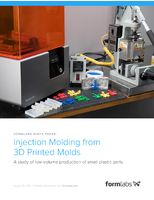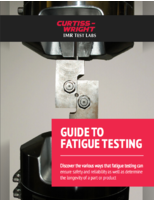DRO Aids Repeated Success in Niche Markets
Share:
For a number of years Southampton-based subcontract machinist, RS Tooling Ltd, has deployed digital readout (DRO) technology from Newall Measurement Systems to help increase the ease-of-use, efficiency and repeatability of its large, manual turning machines used to complete contracts for specialist markets. Continuing this trend, the company has just acquired a Newall B60 two-axis DRO for use on a large (120" bed, 48" swing) Dean, Smith & Grace (DSG) type 30 lathe, ensuring RS Tooling can maintain continuity of supply on a new contract for an established customer, a feat that the company's proprietor says would otherwise be almost impossible.
"The only way to guarantee machining work in the UK is to target niche markets," says RS Tooling's co-owner, Tony Clark. "Over the years we have slowly built up an armoury of large turning and milling machines that, along with our growing expertise, has allowed us to penetrate niche markets such as the contact lens industry, work for ship engine high pressure fuel lines, armament contracts and the undersea cable sector."
However, one difficulty the company has encountered is the lack of skills available in the area to operate its large, mainly manual machines. "When ranging across large diameters (up to 1200mm) we previously relied on the operator to set up length bars and stops and, of course, wind the dials. Even using highly skilled operatives this method can be prone to errors."
To combat the difficulty, a few years ago RS Tooling acquired a Newall DP7 DRO and fitted it to a DSG type 21 lathe. "All of sudden we found we could punch in data and we were off and running. It only took us about half-a-day to learn how to use it. We were getting through the work a lot quicker, without any mistakes," he says.
Such was the success of the project that RS Tooling subsequently fitted another Newall DRO to a type 17 DSG before buying its first B60, which was fitted to a Harrison toolroom lathe. Then, in early 2006, one of its biggest and most established customers, Rivers Engineering in Winchester, a supplier of machined parts and assemblies to the aerospace, atomic and defence industries, made RS Tooling aware of some forthcoming turning contracts that featured unusually long lengths. With this in mind the company sourced a type 30 DSG lathe with 120" bed and 42" swing-over-bed.
"The machine was screaming out for a DRO and the B60 from Newall was by far the best option," says Mr Clark. "The B60 with the SPHEROSYN inductive based linear encoders, is such a strong system on a lathe. On big turning jobs, swarf can sometimes do a lot of damage, but we don't have to worry about the B60 or contamination with the scales."
Another factor that Mr Clark likes about the Newall B60 is its extraordinary repeatability. "We've been using Newall DRO's for a long time now and I can honestly say we have never had one of them do something wrong. We machine an awful lot of large, expensive billets of material, some costing up to £1000, so we really cannot afford any scrap. One job, a crane spindle used in nuclear disarmament programmes, features nine journals along a 1400mm length. All of the journals run to within 0.02mm, with ±0.02mm on the diameters. A relief is also required between each journal. Using the B60 this kind of job is made so much easier - previously we would have been counting the turns of the handle."
The B60 from Newall is suitable for two or three-axis machine tools including manual lathes and milling machines. The DRO is housed in a rugged die cast chassis making it ideal for most machine shop, toolroom and model shop environments. The standard product is sold as being suitable for both turning and milling applications - the user simply selects the appropriate function. For lathe users this will allow the creation of up to 99 tool offsets, whereas for milling applications, operators will be able to perform bolt-hole circle (PCD) functions.
With just a couple of connections to be made/unmade the B60 DRO can be readily transferred between linear scales sets located on each machine, thus keeping capital outlay to an absolute minimum.
"I honestly don't think we would be in business if we hadn't used Newall technology," concludes Mr Clark. "Today all machining work is highly competitive and we just wouldn't be able to harness our costs without these DROs."




